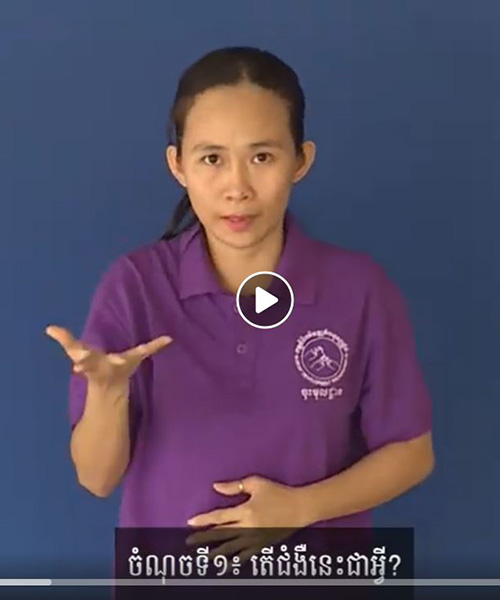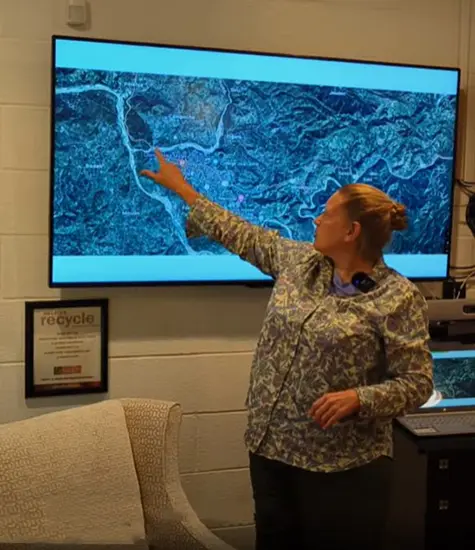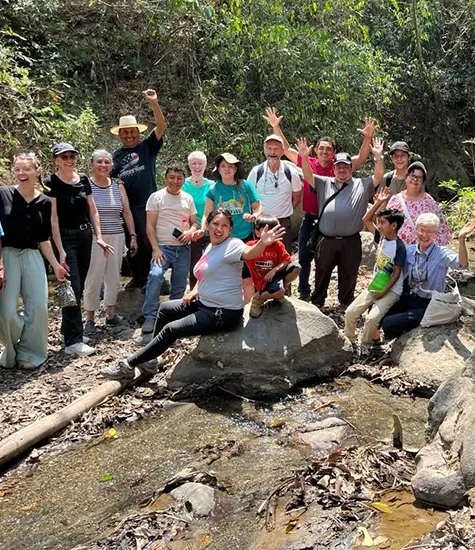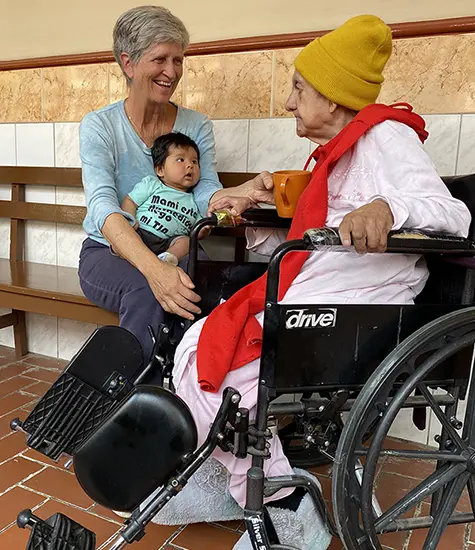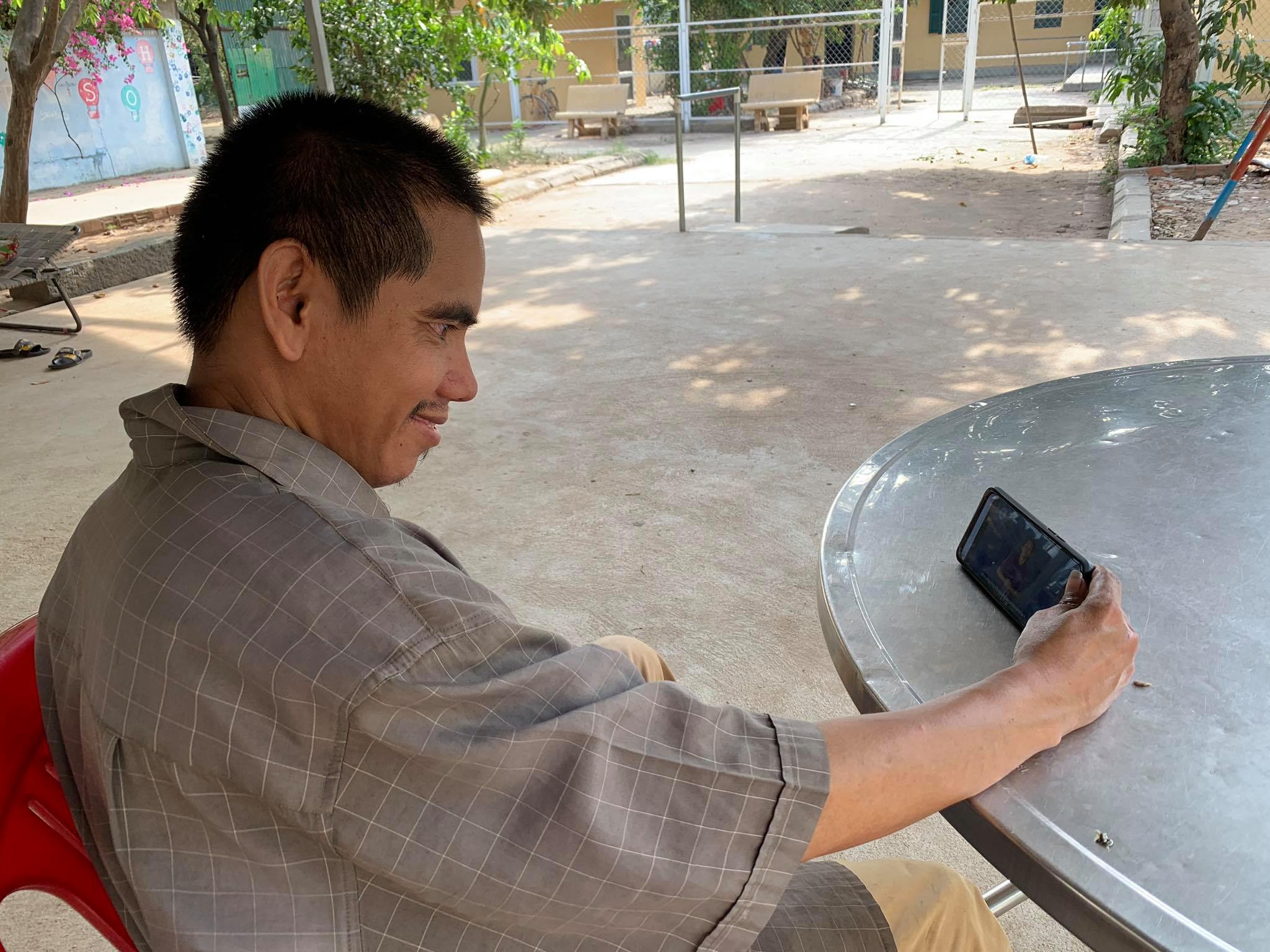
Choub Kosal, who was born profoundly deaf, views the COVID-19 public service video that the Maryknoll Deaf Development Programme helped to create in Cambodian Sign Language.
As the current COVID-19 pandemic unfolds, how would you be able to cope without having access to the vital information that is being shared around you and in the news? Unable to find information in your first language to help you understand what was going on, wouldn’t you feel anxious, worried or scared?
This is the situation for many deaf and hard-of-hearing people around the world. Viewing the nightly news on TV or social media videos that do not have sign language interpreters, leaves them feeling frustrated, left out, confused and anxious. Access to reliable information and pressing new details are crucial to fighting the spread of COVID-19 and helping people to stay calm, gain knowledge on how to protect themselves and finally learn what they can do if they do have the virus.

Choub Kosal watches DDP interpreter Theoung Sreytin sign vital COVID-19 information.
In Cambodia at last, there has recently been a significant breakthrough for the Deaf community, thanks in large part to the Maryknoll Deaf Development Programme (DDP) in Phnom Penh. For more than 20 years, this project of Maryknoll missioners in Cambodia has been a pioneer and leader in helping Cambodia’s Deaf community build a better future.
The project has been instrumental in developing Cambodian Sign Language, a culturally adapted sign language that allows deaf Cambodians to communicate, to form friendships with people across the country, earn livelihoods, access information through interpreters and build up a community through which they advocate for themselves.
When the COVID-19 pandemic spread in Cambodia—as of April 9, the country had 119 confirmed cases—the Cambodian Sign Language interpreters of DDP provided sign language interpretation in general educational videos created by the Cambodian government’s Ministry of Health and other entities. According to Keat Sokly, the co-director of the DDP, the focus of these videos was to “target everyone, people with disabilities and people without disabilities.” These videos are providing the content in Cambodian Sign Language, with an interpreter in a corner of the video.
Keat said, “Having accessible information for the deaf has been a new development in Cambodia. In the past year, the country’s deaf individuals who understand Cambodian Sign Language have had more access to current events and news reports.” He credites a push by Prime Minister Hun Sen “to include interpreters for the deaf in TV news programs, where they now appear in the bottom right corner of the screen.”
Further supporting the needs of the deaf during the coronavirus crisis, DDP helped to create a public service video that specifically addresses the deaf population. On April 3, the Cambodian Ministry of Social Affairs, the Department of Welfare of People with Disabilities, and the World Health Organization (WHO) shared the video with essential information related to COVID-19: knowing the symptoms, how to avoid catching the virus, and what to do if you think you have the virus.
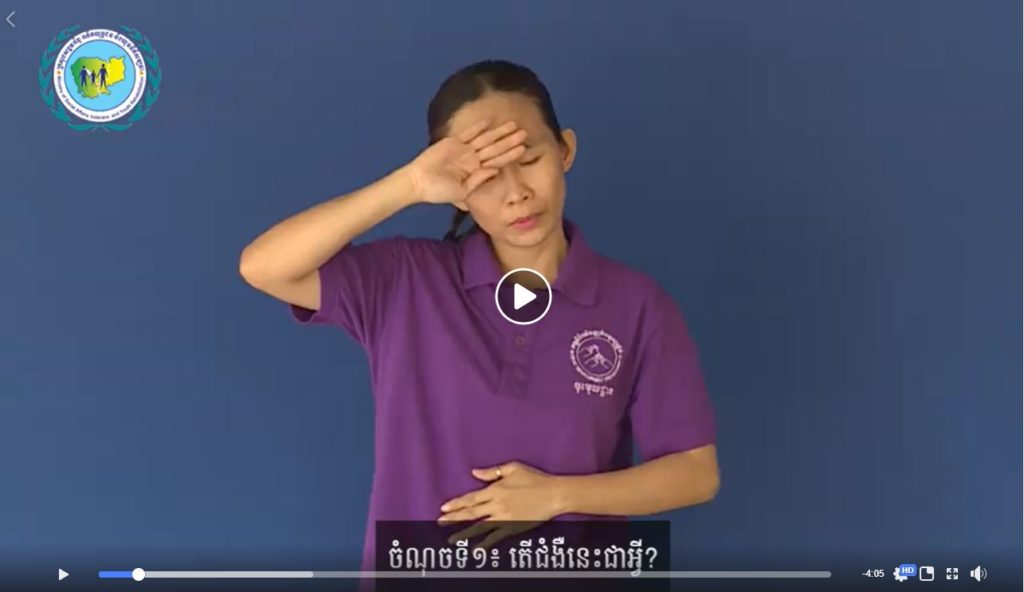
Theoung Sreytin signing in the public service video about COVID-19.
Collaborating with these organizations, the DDP provided a deaf signer to translate the message into Cambodian Sign Language. DDP employee Theoung Sreytin, who was born profoundly deaf, was asked to do this video. “She used the content that was provided to her by these organizations and delivered the message in Cambodian Sign Language,” said Keat, “Theoung was given the freedom to choose her own signs for the concepts being explained, not controlled by other hearing people supporting this project. As a result, she was able to ensure the best possible interpretation and felt confident that it would be understood by Cambodia’s Deaf community.”
The most effective and best way to share information in Cambodia is on social media using Facebook, so that the information reaches a high percentage of people all over the country. Even though these specific educational videos have been a big help in spreading information about COVID-19 in the Deaf community, there are still other concerns for the safety and health of Cambodia’s deaf citizens.
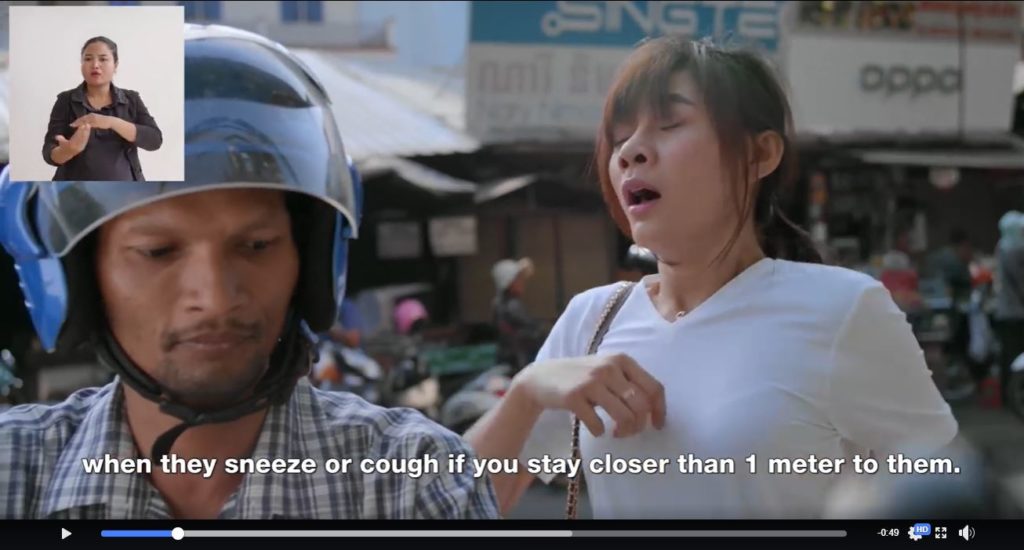
COVID-19 PSA with DDP sign language interpreter Korn Maly at top left.
Keat explained, “The videos are only accessible to those deaf people who have received an education and understand Cambodian Sign Language. There are still a number of deaf people in the country who have not yet been exposed to Cambodian Sign Language and have not received an education.” These deaf individuals have only limited ways of communicating with their families and still lack basic information about COVID-19.
Keat also noted that DDP and its staff are located only in Phnom Penh. “We are the only organization that provides interpreters for deaf individuals in all of Cambodia. Luckily at this time, we have not yet received any requests for an interpreter to go to the hospital for this virus.”
According to Keat, “In the near future, as COVID-19 continues to spread, there are several other new projects in the works between the Ministry of Affairs, Veterans and Rehabilitation and other organizations like the Disability Action Council, UNICEF and USAID.” These groups are trying to keep the information of these public service videos current and are planning to produce more videos in the weeks to come.
Over the past 20 years, many Maryknoll lay missioners have been involved in developing, accompanying, assisting and building capacity for different aspects or programs of the Deaf Development Programme. Currently three Maryknoll lay missioners serve with DDP: Father Charlie Dittmeier, a member of Maryknoll Lay Missioners as well as a Maryknoll-affilated diocesan priest, has been with the project for 19 years and is the organization’s other co-director; Russ Brine serves as its finance manager; and newly arrived Julie Lawler is an experienced deaf educator.
Photos by Keat Sokly

